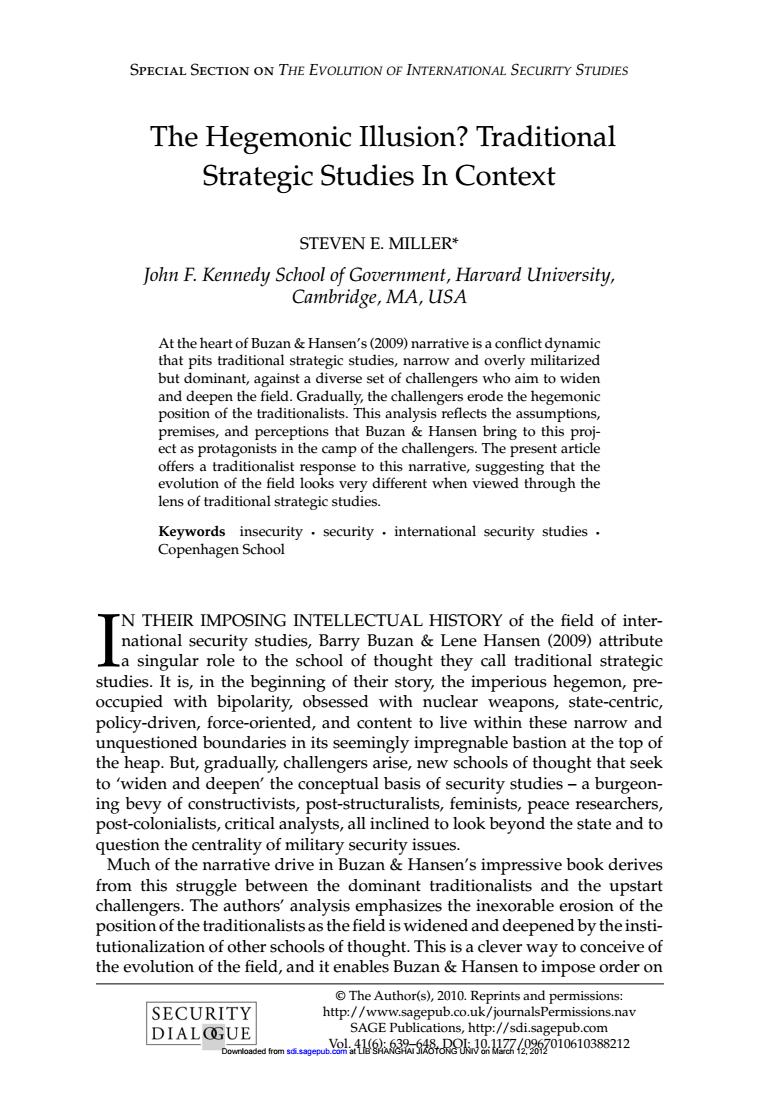正在加载图片...

SPECIAL SECTION ON THE EVOLUTION OF INTERNATIONAL SECURITY STUDIES The Hegemonic Illusion?Traditional Strategic Studies In Context STEVEN E.MILLER* John F.Kennedy School of Government,Harvard University, Cambridge,MA,UISA At the heart of Buzan Hansen's(2009)narrative is a conflict dynamic that pits traditional strategic studies,narrow and overly militarized but dominant,against a diverse set of challengers who aim to widen and deepen the field.Gradually,the challengers erode the hegemonic position of the traditionalists.This analysis reflects the assumptions, premises,and perceptions that Buzan Hansen bring to this proj- ect as protagonists in the camp of the challengers.The present article offers a traditionalist response to this narrative,suggesting that the evolution of the field looks very different when viewed through the lens of traditional strategic studies. Keywords insecurity·security·international security studies· Copenhagen School N THEIR IMPOSING INTELLECTUAL HISTORY of the field of inter- national security studies,Barry Buzan Lene Hansen (2009)attribute a singular role to the school of thought they call traditional strategic studies.It is,in the beginning of their story,the imperious hegemon,pre- occupied with bipolarity,obsessed with nuclear weapons,state-centric, policy-driven,force-oriented,and content to live within these narrow and unquestioned boundaries in its seemingly impregnable bastion at the top of the heap.But,gradually,challengers arise,new schools of thought that seek to widen and deepen'the conceptual basis of security studies-a burgeon- ing bevy of constructivists,post-structuralists,feminists,peace researchers, post-colonialists,critical analysts,all inclined to look beyond the state and to question the centrality of military security issues. Much of the narrative drive in Buzan Hansen's impressive book derives from this struggle between the dominant traditionalists and the upstart challengers.The authors'analysis emphasizes the inexorable erosion of the position of the traditionalists as the field is widened and deepened by the insti- tutionalization of other schools of thought.This is a clever way to conceive of the evolution of the field,and it enables Buzan Hansen to impose order on @The Author(s),2010.Reprints and permissions: SECURITY http://www.sagepub.co.uk/journalsPermissions.nav DIALOGUE SAGE Publications,http://sdi.sagepub.com Dowrloaded from sdi.sagepub al41k388RJ91Z7/%7010610388212© The Author(s), 2010. Reprints and permissions: http://www.sagepub.co.uk/journalsPermissions.nav SAGE Publications, http://sdi.sagepub.com Vol. 41(6): 639–648, DOI: 10.1177/0967010610388212 The Hegemonic Illusion? Traditional Strategic Studies In Context STEVEN E. MILLER* John F. Kennedy School of Government, Harvard University, Cambridge, MA, USA At the heart of Buzan & Hansen’s (2009) narrative is a conflict dynamic that pits traditional strategic studies, narrow and overly militarized but dominant, against a diverse set of challengers who aim to widen and deepen the field. Gradually, the challengers erode the hegemonic position of the traditionalists. This analysis reflects the assumptions, premises, and perceptions that Buzan & Hansen bring to this project as protagonists in the camp of the challengers. The present article offers a traditionalist response to this narrative, suggesting that the evolution of the field looks very different when viewed through the lens of traditional strategic studies. Keywords insecurity • security • international security studies • Copenhagen School I N THEIR IMPOSING INTELLECTUAL HISTORY of the field of international security studies, Barry Buzan & Lene Hansen (2009) attribute a singular role to the school of thought they call traditional strategic studies. It is, in the beginning of their story, the imperious hegemon, preoccupied with bipolarity, obsessed with nuclear weapons, state-centric, policy-driven, force-oriented, and content to live within these narrow and unquestioned boundaries in its seemingly impregnable bastion at the top of the heap. But, gradually, challengers arise, new schools of thought that seek to ‘widen and deepen’ the conceptual basis of security studies – a burgeoning bevy of constructivists, post-structuralists, feminists, peace researchers, post-colonialists, critical analysts, all inclined to look beyond the state and to question the centrality of military security issues. Much of the narrative drive in Buzan & Hansen’s impressive book derives from this struggle between the dominant traditionalists and the upstart challengers. The authors’ analysis emphasizes the inexorable erosion of the position of the traditionalists as the field is widened and deepened by the institutionalization of other schools of thought. This is a clever way to conceive of the evolution of the field, and it enables Buzan & Hansen to impose order on Special Section on The Evolution of International Security Studies Downloaded from sdi.sagepub.com at LIB SHANGHAI JIAOTONG UNIV on March 12, 2012